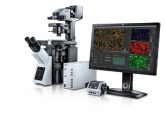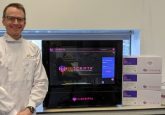High through-put single-cell proteomics

A method to rapidly profile the entire proteome of each cell in a population has seemed nearly impossible, until now.

Individual cells in a population can have very different patterns of protein expression even if the cells are all the same type. This heterogeneity has important consequences for the biological behavior of groups of cells such as tissues and tumors. To study this heterogeneity, it would be valuable to have a method for the high-throughput analysis of protein expression in a large group of single cells.
While flow cytometry of fluorescent antibody–labeled cells can provide the necessary speed and sensitivity to profile proteins in millions of individual cells, it is only possible to simultaneously track tens of different proteins using this approach, which is inadequate for tracking the entire proteome comprising more than 20,000 proteins in a single human cell.
Now, a team of researchers led by Adam Abate at the University of California, San Francisco, describes Abseq, a method that theoretically allows multiplex detection of all the proteins in a single cell. As with flow cytometry, the researchers used antibodies to detect the proteins of interest in the cell. However, instead of fluorophores, they tagged the antibodies with unique DNA tags, which can be detected by sequencing. This greatly increases the number of different antibodies that can be distinguished, since a DNA tag of 10 bases provides > 1 million different sequences, and it also increases the sensitivity of protein detection since the tags can be amplified.
In order to work for a large cell population, this approach must be able to pool the tags of all the cells into one sequencing reaction while allowing the tag sequences from each cell to be distinguished from those of the other cells. The team did this using droplet microfluidic barcoding: A droplet containing a single antibody-labeled cell is fused with a droplet containing multiple copies of a unique cell barcode DNA sequence, which is then spliced to all the DNA tags from that cell by overlap extension PCR, thereby uniquely identifying all the DNA tags from each cell.
In proof-of-principle experiments, the authors demonstrated that Abseq could be used to analyze the surface proteins of single cells and to differentiate cells based on their proteomic profiles.





